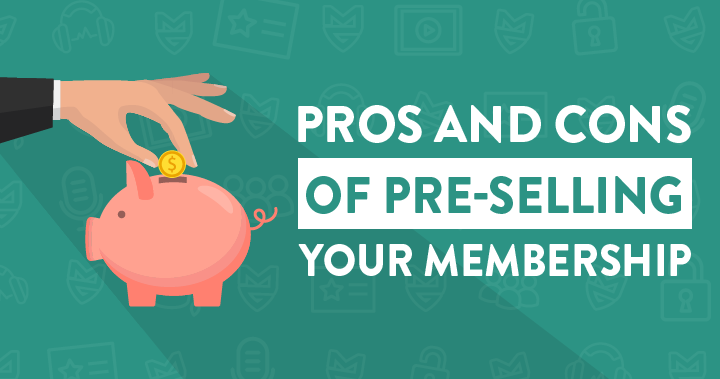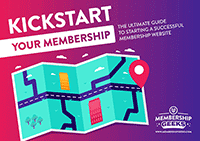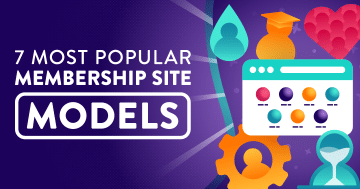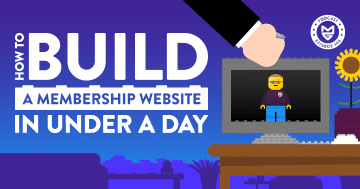Turning your membership idea into a reality can take a lot of time and, often, a lot of money.
As such you might be trying to find a way to raise funds earlier in the process.
Some membership owners do this with a pre-sale.
A pre-sale works like this: you have a great idea for a membership, so you test its viability by taking it to your audience to see if they are willing to invest in your concept (even though it doesn't exist yet!).
If they are, then you can generate seed money to help finance the development of your membership.
A pre-sale – otherwise known as a seed launch, founder launch, or founding member launch – was popularized by Jeff Walker in his book “Launch“, and is an attractive idea on the surface.
However, it's essential to go into a pre-sale with your eyes wide open and be aware of the pros and cons:
Pro: Raises Capital
One of the primary reasons for choosing to do a pre-sale is to raise seed money.
Anyone who's already a membership site owner knows that there are numerous costs involved in getting up and running, and some starting money can help you go a long way.
Even if you're using free membership plugins and themes, there are always other costs.
Web hosting, email marketing, and domain names aren't free, and if you don't have the capital already, seed money would be a huge benefit to starting your membership.
Pro: Validates Interest
A pre-sale is a fantastic way to determine if there's a demand in the market for your idea.
It's challenging to compel people to pay for something that doesn't exist yet (more about this later).
If your idea has the power to get people to invest in it before it's a tangible product, then you'll get the validation you need to continue with the project.
A good reception to a pre-sale is a great indicator that many people will be very interested in paying for it when you take a more substantial product to market.
The bonus to this is that it's a major confidence boost!
Pro: Commits you to Action
Knowing that people are interested and excited about your idea will help motivate you to move forward with the confidence that your efforts will pay off.
If that's not enough, you'll be morally obliged to follow through with your promises once you've taken money from the interested parties.
It's going to help (or force) you to commit to developing your membership, as you now have paying customers waiting to use it.
Pro: Identifies your True Fans
I'm a big believer in Kevin Kelly's concept of 1,000 true fans.
If someone is willing to invest in nothing more than an idea, then it's fair to say that they're probably a true fan!
These will be people you can turn to later to help test your product in its later stages of development and can rely on to give you honest, constructive feedback about what's working and what's not in your membership.
Pro: Gives you a Better Starting Point
Pre-selling your membership means that when you finally launch, you're not starting from zero.
You can let those people who committed to your membership early into your community ahead of opening your doors to the public.
This means that when you fully launch your membership, there'll already be people on the inside waiting to welcome your new members.
That can make the world of difference compared to having new recruits coming into an empty community.
Right now, a pre-sale might sound like a great idea.
But before you start asking people to invest in your membership concept, what are the downsides you need to look out for?
Con: Incompatible with the Subscription Model
One of the first things to know is that a pre-sale isn't compatible with recurring subscription models.
If you're asking people to start paying you monthly for something that's not likely to come to fruition until several months down the line, that's a pretty big ask!
The only logical option when doing a pre-sale is to set the cost as a one-off payment.
And this one-off payment still has to be very attractive for people who are investing at such an early stage, so often you have to offer a very low price that gives people lifetime membership.
This can cause problems…
The idea of a pre-sale is that you're taking an early concept to market, where you likely haven't figured out the specifics.
By the time you've fully fleshed out your idea and turned it into a final product, it could have changed completely.
You might have sold people on the idea of a fairly standard membership, and you charged a pre-sale lifetime fee of $100; but in development, that idea could have morphed into an intensive one-on-one coaching program that now costs over $300 per month.
Despite this, you have to honor the agreement you made during your pre-sale; which means you end up losing out in a big way.
The danger of offering lifetime membership is that nobody knows what will happen in the future, and while it might seem like an attractive prospect, it could also be an eventual pitfall.
Con: It's Poor Idea Validation
We've already mentioned that when lots of people respond positively to a pre-sale, it can really help propel your membership development forward – but what happens if nobody responds?
We've seen so many people throw away great membership ideas because their pre-sale didn't go as they'd planned.

Nobody taking you up on your pre-sale can leave you feeling that there's no point continuing with your plans
But we’ll let you in on a secret: the response to your pre-sale can be misleading.
While a good response to a pre-sale is often a good indicator of how your product will perform when it goes live, it doesn't mean that a negative or a non-existent response means that your membership idea is a dud.
Remember, you're trying to get people to be excited about an idea.
And often an undeveloped idea at that.
A pre-sale generally works better if you have an established audience who will pretty much buy into anything you offer them.
Without this, you have to be prepared that people might not show a lot of interest – because it's a hard sell.
So if you don't get the response you hope for, you cannot let that put you off creating your membership.
Con: Piles on the Pressure
Although investment can be a great boost for your membership, it can also turn up the pressure.
While some investors might understand that it'll be some time before they can use your membership, others might start piling on the pressure to gain access to the product that they've already paid for.
When you're developing a membership, the last thing you want is to feel rushed or like you have to compromise to satisfy your seed members faster.
And there's also the potential for you to completely change your mind on creating a membership altogether.
That's when you might find yourself in trouble…
Because if you scrap your plans, the expectation is that you'll return the payments made by your seed members.
However… that's money you've probably already spent!
You likely wouldn't be doing a pre-sale at all, if not to raise the capital to spend on plugins, hosting and all those other startup costs.
And even if you did have that seed money set aside and are able to return it, the damage to your reputation could be of even greater cost long term.
What is the alternative to a pre-sale?
Rather than trying to pre-sell an early concept, our preference is to launch it with something more substantial than just a nugget of an idea.
We suggest creating a minimum viable product (MVP) and bringing something tangible to the market instead of just a concept.
An MVP has all the benefits of a pre-sale, it'll help you test the market and raise funds, but there are no ties and far less pressure.
A great way to bring an MVP to market is with a pilot program using our lean live launch strategy:
If you're still weighing up the pros and cons of a pre-sale, consider whether an MVP would be a better option.
We see people get much better results with an MVP. However, that doesn't mean that a pre-sale can't be beneficial to you.
Hopefully you now have a better understanding what's in store for you, whether you decide to pre-sell your membership or not.





